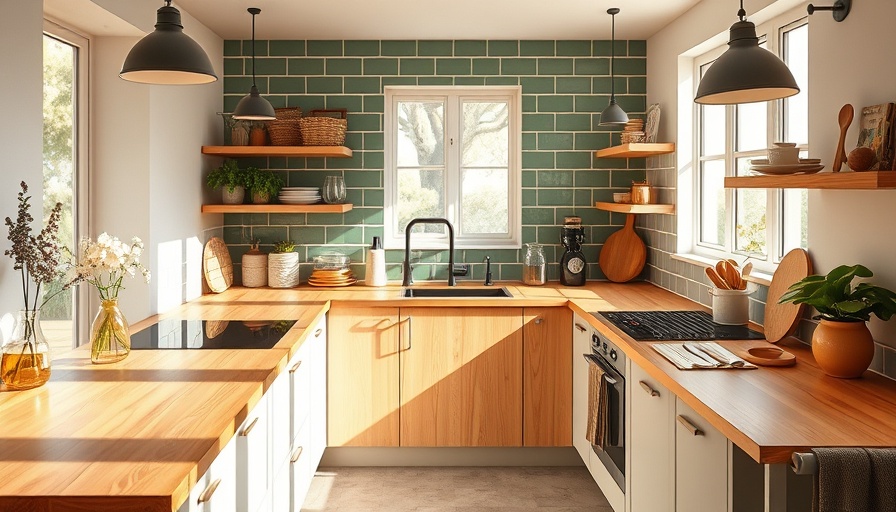
Bringing Charm to Your Kitchen: Embrace Wood Countertops
As homeowners increasingly seek warmth and character in their spaces, wood kitchen countertops present a highly sought-after option. From sleek finishes to rustic textures, wood can transform a kitchen into a warm and inviting environment. Yet, choosing wood as a countertop material comes with its own set of considerations regarding care and maintenance that potential buyers must remember.
Choosing the Right Wood: Beyond Aesthetics
The selection of wood plays a crucial role in both the beauty and durability of your kitchen countertops. Opting for dense hardwoods such as mahogany, hard maple, or white oak can ensure longevity and resistance to wear, making them an excellent investment. According to CZ Woodworking, “They’re not just beautiful—they’ll hold up over time, even with regular use.” While softer woods may appeal due to their initial allure, they typically require more upkeep.
Balancing Beauty With Practicality
A wood countertop does not just offer aesthetic appeal; it brings practicality to the kitchen. Butcher block-style countertops are favored among home cooks for food prep. However, as highlighted by Alex K. Liang, wood does not resist heat or moisture as effectively as stone counterparts. Homeowners should be cautious and use trivets and cutting boards to protect their investment and maintain the beauty of their wood countertops.
Reclaimed Wood Options: History and Sustainability
Reclaimed wood countertops not only tell a story but also elevate a kitchen's style with a unique rustic vibe. Sources like Michigan Reclaimed Barns & Lumber note, “They instantly elevate a room without making it feel like a hunting lodge.” Choosing reclaimed wood reflects a commitment to sustainability, as it repurposes materials that may otherwise contribute to waste. Moreover, sourcing locally supports communities and further enhances the eco-friendly appeal of your renovation.
Sustainability: A Growing Trend in Kitchen Design
With an increasing emphasis on sustainability in home renovations, wood countertops stand out as a material that can reduce environmental impact. As Greenhome articulates, “When you source wood locally, you’re not only adding warmth to your space—you’re making an environmentally sound choice.” Wood’s natural qualities, including the ability to sand and refinish, allow it to outlast many modern materials, making it a wise choice for eco-conscious homeowners.
Finishing Touches: How to Enhance the Wood’s Beauty
Choosing the right finish for wood countertops can significantly impact their appearance and longevity. Different stains can accentuate the natural grain, offering unique personality to each surface. ATX Boards advises “When picking hardwood countertops, think about style, tone, and finish.”> Proper upkeep through the application of food-safe oils or conditioners ensures the wood remains vibrant and resistant to moisture and stains.
Common Misconceptions About Wood Countertops
Despite the versatility of wood, several misconceptions exist surrounding its maintenance and longevity. Some believe wood is prone to water damage or easily stained. However, with appropriate care, wood surfaces can withstand daily wear and remain beautiful for years. According to experts, using wood bactericides and regularly conditioning the surface can effectively extend its life while combating bacteria and moisture.
What to Expect: The Cost of Wood Countertops
Understanding the cost implications of wood countertops is essential for budget planning. Options like butcher block start at relatively lower price points, but high-end hardwoods or reclaimed wood can become quite a significant investment. Comparing these options with other materials such as granite or quartz allows homeowners to strategically allocate their renovation budgets based on both aesthetics and application.
Consumer Insights: What Potential Buyers Should Consider
The evolving real estate market showcases growing interest in properties equipped with high-quality, environmentally-friendly materials. As noted in various reports, including insights from Redfin, homes that highlight their eco-friendliness and use sustainable materials tend to attract discerning buyers. Beyond mere functionality, the emotional attachment to natural materials like wood plays a key role in attracting potential homeowners, offering warmth and charm that resonates deeply.
Final Thoughts and Decision Making
As you plan your kitchen overhaul, keep in mind the unique advantages provided by wood countertops. Their blend of aesthetics, durability, and sustainability creates an opportunity for kitchen excellence. From the warmth they add to the practicality of choosing hardwoods, wood countertops can greatly enhance not just the look, but also the feel and functionality of your kitchen.
For those looking to explore the vast potential of wood countertops, consider connecting with a qualified real estate professional to identify homes that offer the renovation opportunities or features you desire. Speak with real estate agents familiar with properties that excel in sustainable or uniquely designed kitchens.
 Add Row
Add Row  Add
Add 



Write A Comment